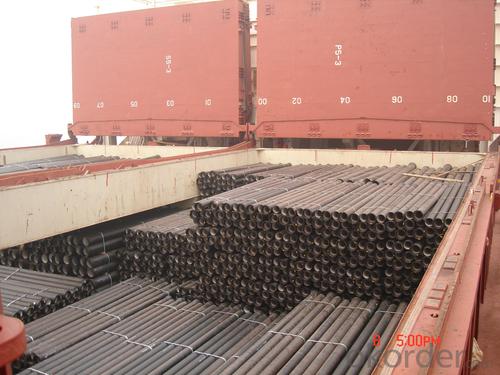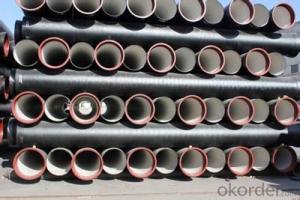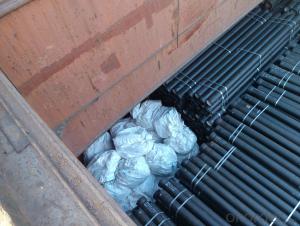DUCTILE IRON PIPE DN700 K9/C
- Loading Port:
- China Main Port
- Payment Terms:
- TT OR LC
- Min Order Qty:
- -
- Supply Capability:
- -
OKorder Service Pledge
OKorder Financial Service
You Might Also Like
Specification:
1) The standard of pipe: ISO2531:1998, K9
2) Effective length: 6m
3) Inner cement line: Portland cement line as per ISO4179
4) Zinc coating: at least 130g/m2 as per ISO8179
5) Bitumen painting: at least 70um as per ISO8179
6) With 100% quantity of NBR ring, or SBR ring, or EPDM ring as per ISO4633
7) DN80mm-800mm
8) High strength, lighter than grey iron, good corrosion resistance, no furring, small flow resistance, easy fixing, long life tome about 100 yeas
9) Produced by Hangzhou chunfeng machine
10) Checked by automatic inspection equipment
11) Composition:
Chemical composition | | | | |||
Chemical composition | Ductile Cast Iron Pipe (%) | Grey iron pipe (%) | Steel pipe (%) | | | |
C | 3.5-4.0 | 3.2-3.8 | 0.1-0.2 | | | |
Si | 1.9-2.6 | 1.4-2.2 | 0.15-0.4 | | | |
Mn | 0.15-0.45 | 0.4-0.6 | 0.3-0.6 | | | |
P | ≤0.06 | ≤0.3 | 0.02-0.03 | | | |
S | ≤0.02 | ≤0.1 | 0.02-0.03 | | | |
Mg | 0.03-0.06 |
|
| | | |
12) Feature:
Mechanical properties | | | | |||
| Ductile Cast Iron Pipe | Grey Iron Pipe | Steel Pipe | | | |
Tensile Strength(Mpa) | ≥420 | 150-260 | ≥400 | | | |
Yield Strength(Mpa) | ≥300 | No Confirmation | No Confirmation | | | |
Bending Strength(Mpa) | ≥590 | 200-360 | ≥400 | | | |
Elongation (%) | ≥10 | Neglected | ≥18 | | | |
Brinell Hardness(HBS) | ≤230 | ≤230 | About 140 | | | |
13) T type mechanical joint
14) Packing: in bulk or container
- Q: How does ductile iron pipe perform in extreme temperatures?
- Ductile iron pipe performs well in extreme temperatures due to its ability to expand and contract without cracking or breaking. It has a high thermal conductivity, allowing it to efficiently transfer heat without compromising its structural integrity. Additionally, its corrosion resistance properties make it suitable for both hot and cold environments, ensuring long-term performance even in extreme temperature conditions.
- Q: Are ductile iron pipes suitable for gravity sewer systems?
- Yes, ductile iron pipes are suitable for gravity sewer systems. Ductile iron pipes have high strength, durability, and flexibility, making them an excellent choice for underground sewer networks. They can withstand the pressure and weight of the soil above them, making them ideal for gravity flow systems where wastewater flows naturally due to gravity. Additionally, ductile iron pipes have a long lifespan and are resistant to corrosion, making them a reliable and cost-effective solution for gravity sewer systems.
- Q: What is the expected joint restraint method for ductile iron pipes?
- Typically, when it comes to joint restraint methods for ductile iron pipes, the two commonly used options are mechanical joints or push-on joints. Both of these joint types are reliable and prevent leaks, ensuring the stability and integrity of the pipeline system. Mechanical joints involve the use of rubber gaskets and bolts to tightly seal the joints, while push-on joints rely on a groove and rubber gasket system to create a watertight seal. Both methods have excellent joint restraint capabilities and allow for the smooth transmission of fluids or gases through the pipeline without any risk of joint separation or failure. Moreover, these joint restraint methods also make installation and maintenance easier, which is why they are often preferred for ductile iron pipe systems.
- Q: How do ductile iron pipes handle ground movement near rivers and lakes?
- Ductile iron pipes are well-suited to handle ground movement near rivers and lakes due to their unique properties and construction. These pipes are made from a type of cast iron that is known for its high strength and flexibility, making them highly resistant to ground movement and other external forces. One of the key features of ductile iron pipes is their ability to withstand bending and stretching without breaking. This flexibility allows the pipes to adapt to ground movements, whether they are caused by natural factors like soil settling, erosion, or even seismic activity. The pipes can absorb and distribute the stress caused by ground movement, reducing the risk of cracks or fractures. Additionally, ductile iron pipes have a high impact resistance, which means they can withstand external forces such as pressure from shifting soil or heavy equipment. This makes them less susceptible to damage during ground movements near rivers and lakes where erosion or flooding can occur. Furthermore, ductile iron pipes have a smooth internal surface, which reduces friction and resistance to flow. This ensures efficient water transportation even in areas with ground movement, preventing any potential blockages or disruptions to the water supply system. To enhance their resistance to ground movement, ductile iron pipes are often installed using flexible joints, such as restrained joints or push-on joints, depending on the specific project requirements. These joints allow the pipes to move slightly without causing damage to the overall system, providing additional protection against ground movement near rivers and lakes. In summary, ductile iron pipes are highly capable of handling ground movement near rivers and lakes due to their strength, flexibility, impact resistance, and smooth internal surface. These qualities make them a reliable choice for water transportation systems in areas prone to ground movement, ensuring a durable and efficient infrastructure for the supply of water.
- Q: How do ductile iron pipes handle ground movement or settlement?
- Ductile iron pipes are known for their exceptional strength and flexibility, which allows them to handle ground movement or settlement effectively. Ground movement or settlement refers to the natural shifting or settling of the earth's surface, which can put stress on underground infrastructure like pipes. When it comes to ground movement, ductile iron pipes have the advantage of being able to withstand and absorb the pressure and movement caused by the shifting soil. The ductility of the material allows the pipes to flex and bend to a certain degree without breaking. This flexibility helps to distribute the load and minimize the potential for damage. Moreover, ductile iron pipes have a high resistance to cracking or fracturing, even under extreme conditions. This resilience is due to the unique microstructure of the material, which provides excellent tensile strength and impact resistance. As a result, ductile iron pipes can withstand external forces and ground settlement without compromising their integrity. To further enhance their ability to handle ground movement or settlement, ductile iron pipes are often installed using flexible joints. These joints allow for slight movement and accommodate any shifting or settling of the ground. Additionally, proper bedding and backfilling techniques are employed during installation to provide additional support and stability. Overall, ductile iron pipes have a proven track record in handling ground movement or settlement. Their strength, flexibility, and resistance to cracking make them a reliable choice for underground infrastructure, ensuring the longevity and efficiency of water distribution systems.
- Q: How does ductile iron pipe perform in areas with high groundwater salinity?
- Ductile iron pipe performs well in areas with high groundwater salinity due to its inherent corrosion resistance properties. The high levels of salinity in the groundwater can cause corrosion and deterioration of certain materials, but ductile iron is highly resistant to this type of corrosion. Its composition and manufacturing process make it less susceptible to damage from corrosive elements, such as salt and minerals present in high salinity water. The corrosion resistance of ductile iron pipe is primarily attributed to its protective iron oxide coating, which forms naturally on the interior and exterior surfaces of the pipe. This coating acts as a barrier, preventing direct contact between the pipe and the corrosive elements in the groundwater. Additionally, ductile iron pipes are often lined with cement mortar or a protective epoxy coating, which further enhances their resistance to corrosion and provides an additional layer of protection. Furthermore, ductile iron pipe has a long lifespan, often exceeding 100 years, which makes it ideal for areas with high groundwater salinity. Its durability and resistance to corrosion ensure that it can withstand the harsh conditions associated with high salinity environments, minimizing the need for frequent repairs or replacements. In summary, ductile iron pipe is an excellent choice for areas with high groundwater salinity due to its corrosion resistance properties. Its protective iron oxide coating, coupled with optional linings, provides a reliable and long-lasting solution, ensuring the integrity and performance of the pipe system even in challenging environments.
- Q: Do ductile iron pipes require internal linings or coatings?
- Ductile iron pipes do not typically require internal linings or coatings. Ductile iron is known for its inherent corrosion resistance, which is primarily due to its composition and microstructure. The iron in ductile iron pipes is treated with magnesium, resulting in the formation of graphite nodules that give the material its ductile properties. This microstructure also provides a protective layer on the surface of the pipe, which helps to prevent corrosion. Additionally, ductile iron pipes have been used for several decades without the need for internal linings or coatings, proving their durability and resistance to corrosion. The smooth interior surface of ductile iron pipes also helps to minimize friction and maintain efficient flow rates. However, in certain cases where the conveyed fluid is highly corrosive or abrasive, or if the water quality is aggressive, internal linings or coatings may be recommended. These linings or coatings can be applied to protect the pipe from chemical attack or to prevent the leaching of iron into the water supply. Ultimately, the decision to use internal linings or coatings on ductile iron pipes depends on various factors such as the specific application, water quality, and local regulations. Consulting with professionals in the field, such as engineers or pipe manufacturers, can provide more tailored advice for specific scenarios.
- Q: Are ductile iron pipes suitable for installation in areas with high groundwater contamination and soil erosion?
- Ductile iron pipes are generally suitable for installation in areas with high groundwater contamination and soil erosion. This is because ductile iron pipes are known for their durability, strength, and resistance to corrosion. They have excellent resistance to acidic and alkaline soils, making them suitable for areas with high groundwater contamination. Furthermore, ductile iron pipes have a high resistance to soil erosion due to their robust construction. They are designed to withstand various external forces, including pressure from the surrounding soil and potential movement caused by erosion. This makes them a reliable choice for installation in areas prone to soil erosion. However, it is important to note that while ductile iron pipes can withstand high groundwater contamination and soil erosion, proper installation techniques and maintenance practices should be followed to ensure their longevity and optimal performance. Regular inspections, proper backfilling, and appropriate protective coatings should be employed to maximize the pipe's lifespan. In conclusion, ductile iron pipes are generally suitable for installation in areas with high groundwater contamination and soil erosion. Their durability, strength, resistance to corrosion, and high resistance to soil erosion make them a reliable choice for such environments. However, it is crucial to follow proper installation and maintenance practices to ensure their longevity and optimal performance.
- Q: Ductile iron 600-3 grade, tensile strength, how to test, there is a simple way?
- General use of tensile machines, such as quality management, this aspect should be strictly controlled, otherwise the data is not accurate, do nothing, no one wants
- Q: Can ductile iron pipe be used for power plant cooling water systems?
- Yes, ductile iron pipe can be used for power plant cooling water systems. Ductile iron pipe is known for its strength, durability, and corrosion resistance, making it a suitable choice for transporting water in power plant cooling systems. Additionally, its ability to withstand high pressure and temperature variations makes it a reliable option for such applications.
Send your message to us
DUCTILE IRON PIPE DN700 K9/C
- Loading Port:
- China Main Port
- Payment Terms:
- TT OR LC
- Min Order Qty:
- -
- Supply Capability:
- -
OKorder Service Pledge
OKorder Financial Service
Similar products
Hot products
Hot Searches
Related keywords





























